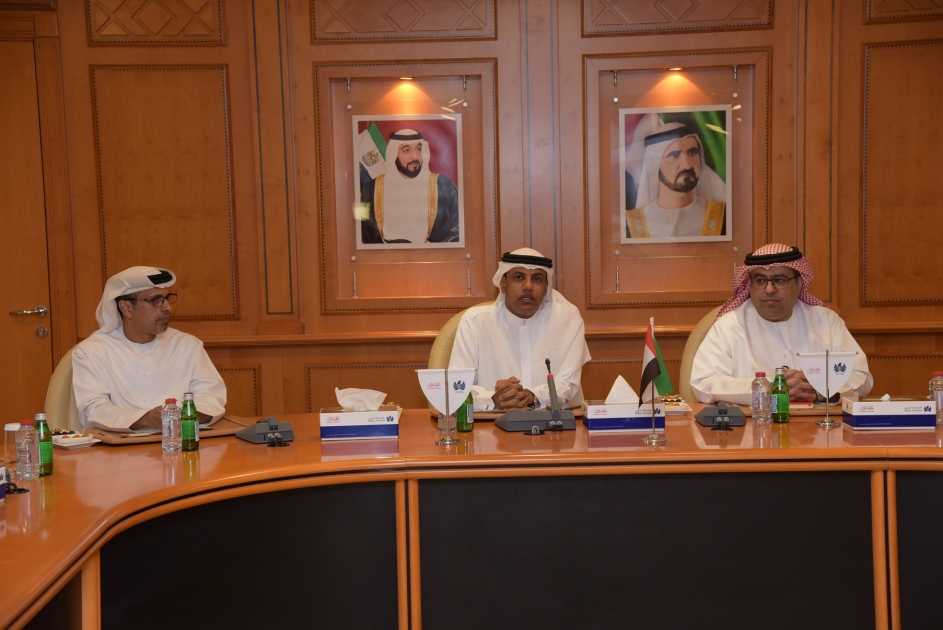
Dubai Customs’ Consultative Council discusses means of boosting cooperation in 2018
Chaired by Ahmed Mahboob Musabih, Director of Dubai Customs (DC), Chairman of Dubai Customs’ Consultative Council, the Council’s third meeting in 2017 convened recently and was attended by heads of business and trade groups, members of the Council. Boosting cooperation and partnership between DC and business and trade groups in Dubai was one of the main items on the meeting’s agenda. The meeting also discussed the initiatives suggested by clients to contribute to the development of services and customs facilitation efforts, as well as the participation of business groups, corporates, and clients in the Customs Week, due to be held in January next year.
The meeting was attended by Juma Al Ghaith, Executive Director of Customs Development Division and vice chairman of the Council, Farid Hassan Al Marzouqi, Executive Director, Human Resources, Finance and Administration Division, Ahmed Abdul Salam Kazim, Director of Strategy and Corporate Excellence, Khalil Saqer bin Gharib, Director of Corporate Communication Department, and Edris Behzad, Client Management Director, the Council’s rapporteur.
Musabih pointed out the meeting will help engage clients and business groups in achieving the future goals of Dubai Customs which fall in line with the UAE Vision 2020 and UAE Centennial 2071.
“Dubai Customs has already succeeded in achieving part of this vision by becoming a leading customs department worldwide in terms of services and logistics which helps the Department top competitiveness indexes. These achievements wouldn’t have happened without the effective cooperation and partnership with the clients and their fruitful suggestions”.
Ahmed Abdul Salam Kazim, Director of Strategy and Corporate Excellence gave a presentation about Dubai trade in 2017. Dubai non-oil external trade jumped up 13% in Q3 to AED 345b compared to AED 305b in the same period last year.
“These positive results are attributed to the business community’s strong performance and efforts of our wise leadership in supporting sustainable growth through advanced technologies and services, supported by great initiatives such as Dubai X10” he said.
On his part, Khalil Saqer bin Gharib, Director of Corporate Communication Department talked about Customs Week which will be held from 21 to 25 January 2018 and coincides with the International Customs Day. It’s a raising awareness initiative to educate different segments of society around the role of Dubai Customs in facilitating trade and protecting society.
Deepak Babani, Chairman of Electronics Group said business groups greatly benefit from the meetings of the Consultative Council in discussing problems and challenges they face.
He added: “Dubai Customs keeps developing and innovating and this has helped reduce time needed to clear air and sea cargo from 3 days to only 3-4 hours”.
“Dubai 10X initiative which is led by the government would make Dubai a global leader in business, and we as private sector need to be actively engaged in this perspective,” said Babani.
Nayana Nandkuma, manager of Dubai Shipping Agents Association, which has more than 80 members, said: “Dubai’s position as a regional trade hub gives freight companies and shipping agents strong competitive advantage to serve the entire region.”
On his part, Sudesh Chaturvedi, manager, Projects & Special Services at GAC Dubai – Freight Services, pointed out that Dubai Customs Consultative Council enables exchange of ideas and expertise as well as is a platform to raise issues to the concerned stakeholders. “This allows us to suggest improvements in other business sectors which eventually helps boost Dubai’s logistics performance as a key part of global trade supply chain.”
Dharmendra Sawlani, president of Dubai Computer Group, commended the efforts undertaken by Dubai Customs over the last ten years towards streamlining Customs processes and procedures in all aspects as per the WTO guidelines.
Nadia Abdulaziz, president of UAE National Association of Freight and Logistics (NAFL), highlighted the importance of the soon-to-be-introduced value-added tax for the UAE economy, noting that the VAT implementation requires all companies to be compliant while maintaining the competiveness of the UAE through bolstering the logistics and trade business.

























